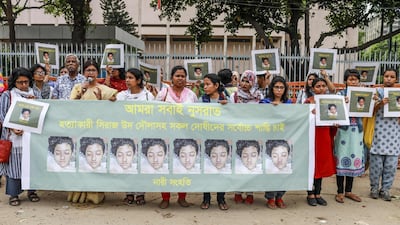“I will fight this crime till my last breath,” said Nusrat Jahan Rafi in an ambulance on the way to Dhaka hospital. The 19-year-old student had been doused with kerosene and set alight by her fellow students when she lodged a complaint with the police alleging that her headteacher had touched her inappropriately.
She died soon after from burns covering 80-per-cent of her body. Before her death, she recorded a statement on her brother’s mobile phone about the event, naming some of the perpetrators.
When Rafi reported the initial event involving her headteacher to the police, she was told it was “no big deal”. One officer filmed her evidence and shared it on social media. She returned to school to sit her exams, but was lured to the roof of a building, where she was attacked and set on fire. Rafi said that at least four of her assailants were dressed in burkas. They were, apparently, going to claim that she committed suicide.
Rafi’s family stood by her from the moment she raised the complaint, and they continue to fight for her today.
It is impossible not to be shaken by this story. Rafi’s headteacher abused her. The police brushed her off, and then betrayed her trust by making her evidence public. People she thought were friends murdered her.
However, the hard truth is that we shouldn’t be surprised. These actions did not come out of nowhere. They were enabled by commonly accepted attitudes and deeply entrenched structures. This is where we need to start the conversation.
When the #MeToo movement kicked off in October 2017, one of the first shocks to many was how widespread its relevance was. Men couldn't believe that so many women they know have suffered abuse and harassment. And many women talked about experiences that they had never previously shared with anyone, for fear of the stigma that doing so would bring.
Even now that the world appears to have reached a broad agreement about the prevalence of harassment and abuse, there is still a collective shrugging of shoulders about its impact, and no consensus as to what should be done. Or, as in the case of Rafi, further victimisation and even death. Her own peers opted to protect her abuser and were willing to resort to murder to do so.
Now, it must be unequivocally stated that there is no place in the world where sexual harassment is acceptable. How many times have you heard phrases like “It’s no big deal”, “It happens to everyone”, or “Men are men … what can you do about that?” It’s horrific to think that nearly half of the population will have faced abuse at some time in their lives, often repeatedly. That’s the person next to you, your mum, your sister, your daughter.
Alongside a change in attitudes, structural changes are vital. In response to Rafi’s murder, the government of Bangladesh has ordered more than 27,000 schools and colleges to form five-member committees, led by female teachers, to combat sexual violence.
It’s an important step. But structural change can be glacially slow, so pressure needs to be kept up.
In 2014, two girls aged 14 and 16 were raped and hanged from a mango tree in Katra Sadatganj, Uttar Pradesh, after having gone to find a secluded area to go to the toilet – a common practice in India, which makes women vulnerable to assault. A government drive to install lavatories was a welcome structural change, but residents of the village say that barely 100 toilets – out of a planned 400, to serve 3,000 homes – have been built. Outrage after the Nirbhaya gang rape in Delhi in 2012 triggered changes in laws about sexual assault prosecution and sentencing, but in India, rape convictions remain low.
All of this is before we even get to the response of the police and the courts to victims of sexual violence. At every turn, the system is stacked against them. As Rafi said, we must continue fight this till our last breath.

